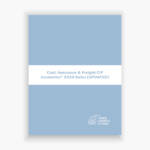
CIF – Cost, Insurance & Freight Mini Guide
Issue 01 . Jan 2019
As with CFR, under CIF, the seller is responsible for packaging the goods for transport, clearing the goods for export, arranging for transport to the named port of destination, and loading the goods at the port of shipment. The bill of lading usually indicates “freight prepaid.” The buyer is responsible for the costs of unloading the goods at the port of destination, the duties, tariffs, and taxes for import customs and any additional transportation costs to the final destination. Under CIF, the seller must purchase cargo insurance, although they are only required to obtain minimum coverage. This will be at Institute Cargo Clauses (C) or similar. The insurance needs to be in the currency of the contract, protect the buyer against the risk of loss, and cover the price provided in the contract plus at least 10 percent. It must cover the goods from the point of delivery to at least the named port of destination. The seller must give the buyer the insurance policy or a certificate under a policy — this document usually evidences the seller as the party being insured so it must then blank endorse the document on the back to allow the buyer to claim should it so require. This is one of only two terms that place a compulsory responsibility for insurance on the seller, the other being CIP.
Download PDF version
Afreximbank
Africa
Agricultural Market
Albania
Algeria
Argentina
Asia
Asset Finance
Australia
More
Delete
Search














